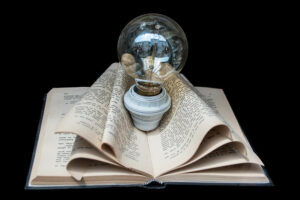Posts by Virginia Pye
The other morning at my desk, fifty pages into writing a new novel, I found myself inventing a scene set in Central Park in the mid-1980s, a time when I had lived in New York with my boyfriend (now husband). I was reminded that in the early ’90s, after moving to Philadelphia, I had drafted a whole novel set in New York during the mid-’80s. I hadn’t thought about that book in years. But here I was again with a fictional setting I had first explored thirty-five years earlier. I clicked out of my new manuscript and went to search my files for the long-forgotten book.
Back then, even with computers widely available, I still penned the first draft of that novel longhand before typing it onto my Dell laptop. I then approached an agent friend and received a tepid response. I wasn’t too deterred. I felt confident there was something to this book and wanted to improve it. But I soon lost interest when our first child arrived. It was a difficult birth and I needed months to recover. When I returned to the manuscript, something had changed. I had changed. The story seemed impossibly far from me. Motherhood and regaining my strength took all my attention.
Years passed, the manuscript stayed in a drawer, and a second child arrived. I focused on being a mother and had time to write only an occasional poem or an essay about this all-consuming new stage of life. When our second child went off to nursery school, I brought out the old manuscript, looked it over, and felt nothing for it. Or to be more precise, I felt an aversion. A story is about a group of post-college friends and a main female character who becomes caught up in a love triangle with two of them, makes bad choices, and suffers dangerous consequences—this troubled landscape felt far from my new life, so rich with family and the all-consuming world of children.
I’ve returned to the novel several times since then. In the 2000s, I hired a typist to transfer if from floppy to hard disk. Some years later, I retyped it to conform to a new format. Each time, the writing felt foreign to me and the story remained dissonant with my life. In the meantime, I published four other novels, and I have a fifth one, Marriage and Other Monuments, forthcoming in February 2026.
But the other day when I reread that manuscript from the ’90s, I recognized it as my own and began to feel something for it. For one thing, the writing seemed daring. Each of my published novels proceeds in chronological order. But this unpublished one jumps in time as a half dozen voices narrate the story. Was I more courageous as a younger writer, or more foolish?
Now the once-troubling plot and characters posed only an interesting writing challenge. I had the right kind of emotional distance, on the narrative and on the writing itself. My husband and I have been married for thirty-eight years and the imagined world of these twenty-somethings in NYC of the mid-’80s is basically historical fiction!
As I read further, I saw that in 2017 I had written whole new sections and added a […]
Read More
My last Writer Unboxed essay discussed the impact of reading on the process of writing. Now, I’d like to celebrate the importance of the creators of the books we love, that is, fellow writers. They are, I believe, in part responsible for the words on my page. They aren’t seated beside me at my desk when I write, but they are in my mind, cheering me on, challenging me, and making my books better through their friendship.
In each of the five cities where I’ve lived since graduating from college, I’ve sought out writers. While getting my MFA at Sarah Lawerence, I lived in New York City and made friends through the writing program, as well as after graduation when I worked at a literary agency, and then as an adjunct writing instructor at New York University. Being around other writers who were striving to pen and place their first books made it easier for me to take myself seriously and write my own first novel and find an agent.
In Philadelphia, where my husband and I moved for his career, I taught at the University of Pennsylvania and found fellow writers who also taught writing, as well as neighbors who were poets and novelists. Those friendships kept my writing alive after I gave birth to our two children. I no longer had time to write novels but could work with other women writers to create a journal called Mother Tongue that captured our experience as new mothers.
In Richmond, Virginia, where we moved when our children were two and five years old, I found fellow authors through a fledgling literary non-profit called James River Writers. After attending one or two meetings, I was coaxed into becoming Secretary of the Board and before I knew it, I was chairing the organization. For the following ten years, I helped establish the reputation of the annual James River Writers Conference and substantially grow the membership. Working with other writers to build a strong, vibrant organization that encourages all writers was hugely important to how I saw myself as a writer. My role as a champion for other writers meant I necessarily had to champion myself.
The effort it takes to organize and support other writers takes time away from one’s desk. There are tradeoffs between making art and building a life that supports that art. But I’ve found that putting in the volunteer hours to connect with other writers, interview published authors, publicize other people’s books, all helped me in my career. Each time my books have come out, fellow writers who I’ve helped were happy to spread the word. But I didn’t do my volunteering for that end. The reward was in the conversations about writing that took place along the way: how to make the words sing on the page, how to deal with rejection, how to find time in our busy lives to create, and every other conceivable angle on the best ways to make a writing life.
Most recently, my husband and I moved as empty nesters to the Boston area, where I grew up. We live in Cambridge, the most bookish city I’ve ever known. People here read on the subway, while walking down the sidewalk, and when […]
Read More
In my last essay for Writer Unboxed, I made a case for not sharing early drafts. For ignoring other voices, especially critical ones, and blocking out the constant noise of everyday life to protect space for the imagination. I encouraged fellow writers, especially newer ones, to listen to the tentative, inchoate voice within. In this essay, I pitch another approach to the writing craft: reading. Finding one’s voice as an author can only happen when we unplug, turn off our phones, shut down our screens, and not just write, but read. Reading is my number one recommendation for how to improve as a writer.
In today’s cacophonous world the goal of sustained reading is harder to achieve than ever and, I would argue, more important. Before the pandemic and farther back, before constant iPhone use, I read fifty to sixty books a year, mostly novels. Post-pandemic, I can’t seem to finish thirty to forty. Those numbers might still sound large, but not if you consider that novel writing is my business. To write good novels, I need to read good novels, and sometimes bad ones. A key part of the practice of becoming a serious writer is to be a serious reader.
The reality of a waning attention span, though, looms over my, and perhaps your, literary life. Recent studies suggest the average undivided attention span for adults today has shrunk to just eight seconds. Eight seconds! Against a statistic like that, novels haven’t got a prayer. More and more people are listening to audio books as a cheat against distraction. You can drive, wash dishes, and walk the dog all while narration reaches some other part of the brain. Listening to a novel may require less concentration than reading a text, but I think still ‘counts’ as reading.
Still, there’s nothing as rewarding and engrossing as deep immersion in a book. It’s a complex experience that can be magical, taking a reader out of the present moment and their own body and into another world. Some people find listening to music transporting. Or watching a film. To my mind, those experiences don’t require the same meeting of imaginations that takes place between a reader and a writer.
But what does this have to do with crafting our own work? I’d say everything. As Margot Livesey has put it, we must “learn to read as a writer, to search out that hidden machinery, which it is the business of art to conceal and the business of the apprentice to comprehend.” As we absorb the written words of others, we not only learn about structure, character development, and all the other choices a writer must make, we also develop a crucial ear for language. So much of good writing is the shape and rhythm of sentences. By reading well-structured syntax, we internalize it and more easily make it our own. Familiarity with the vast array of written voices paradoxically offers a better chance to be innovative and original. How else to know what’s already been done so we don’t repeat it–or are at least aware when we do? In reading broadly, we position ourselves within the literary conversation that’s been carrying on for not just years, but generations.
So, what sorts of […]
Read More
Please welcome our newest contributor, Virginia Pye, to Writer Unboxed!
Virginia is the author of four books of fiction, essays, and short stories. Her latest historical novel, The Literary Undoing of Victoria Swann, was published in October 2023. Her collection, Shelf Life of Happiness won the 2019 Independent Publisher Gold Medal for Short Fiction and one of its stories was nominated for a Pushcart Prize. Her debut novel, River of Dust was an Indie Next Pick and a 2013 Finalist for the Virginia Literary Award. Her second novel, Dreams of the Red Phoenix was named a Best Book of 2015 by the Richmond Times Dispatch.
Virginia has taught writing at New York University and the University of Pennsylvania and, most recently, at Grub Street Writing Center’s Muse and Marketplace Conference in Boston.
You can connect with her here, on her website, or at the social media sites links listed below.
Welcome Virginia!
A question faced by all writers, no matter their level of experience, is how and when to solicit critical feedback. How can you know when your work-in-progress is ready to be seen and who should you trust to respond both honestly and constructively?
The decision is different for short stories. A critic reads them in full and can respond to a writer’s overall intentions. With a longer work, when a reader may respond to only part of the whole, comments can feel less useful. Novel workshops are often structured to offer feedback one chapter at a time. It works for some writers, but in my experience, piecemeal criticism, especially of an early draft, can miss the mark or even lead the writer astray.
The most useful feedback, in my view, responds to the manuscript as a whole. This requires greater commitment from a friend or colleague, of course. And from the novelist, it requires more patience with the process. We can’t rush to finish if we’re waiting to hear back from a reader who’s evaluating the book from beginning to end.
This slowing down can often work in the writer’s favor, a “forced” breather from a manuscript can create much needed distance, even before hearing any comments. More than once, a break from a novel-in-progress has helped me prepare for a critique that’s coming my way.
But when should we ask for this gift of time and insight from our first readers? It’s time to seek out first readers when you’ve done enough self-editing to not feel embarrassed by our effort, and yet still know the manuscript needs plenty of work. A first reader needs to see the big picture, assessing the novel in its entirety and not focusing on the sentence level.
The writer should guide their reader with basic questions, such as what works in my manuscript and what feels weak? What did you want more of? What did you find extraneous? An early reader should be someone whose literary tastes you trust. Not everyone is skilled at giving literary feedback, so you’ll want to avoid anyone who’s too prescriptive or insistent, as their opinions may undermine your confidence or constrain your imagination.
Even with the value and necessity of a first reader, I try not to share a manuscript until I’ve completed a full draft. For me, […]
Read MorePlease welcome an award-winning author of novels and short stories to Writer Unboxed today, Virginia Pye. Virginia’s short story collection, Shelf Life of Happiness, (Press 53) won the 2019 Independent Publisher Gold Medal for Short Fiction, and one of its stories was nominated for a Pushcart Prize. Virginia’s debut novel, River of Dust, (Unbridled Books), was an IndieNext Pick and a 2013 Finalist for the Virginia Literary Award. Her second novel, Dreams of the Red Phoenix, (Unbridled Books), was named a Best Book of 2015 by the Richmond Times Dispatch.
Her latest novel, The Literary Undoing of Victoria Swann, will be published by Regal House Publishing in October.
“How could I not fall in love with Victoria Swann, the wildly successful lady author who is determined to escape her best sellers? Although she never leaves Boston, Victoria’s story is as full of dangers and dragons as one of her novels. Surely all readers will want to find the bookshop where she works and join the Swann bookclub? The Literary Undoing of Victoria Swann is a captivating and delicious novel.” —Margot Livesey, author of The Boy in the Field
Virginia graduated from Wesleyan University and holds an MFA from Sarah Lawrence College. She has been a Tin House Summer Workshop Scholar, an assistant at the Virginia Quarterly Review Conference, and a repeat fellow at the Virginia Center for the Creative Arts. A prolific writer, her essays have appeared in The New York Times, LitHub, The Rumpus, Huffington Post, and the Cleveland Plain-Dealer, as well as numerous literary magazines. She is Fiction Editor for Pangyrus, a literary journal based in Cambridge, Massachusetts, and a board member of the Women’s National Book Association, Boston Chapter. She’s taught writing at New York University and the University of Pennsylvania, and, most recently, at GrubStreet’s Muse and Marketplace Conference in Boston.
You can learn more about Virginia on her website, and by following her on Instagram, Facebook, and Twitter.
Every novel requires its own writing process. Over the years, I’ve distilled that process down to certain elements, even if it varies with each new book. The key thing my process shares across the many drafts is what I bring to the work as a long-time reader. Reading helps me know what’s needed in terms of story, character, voice, and plot. Each writer must find what helps with the excavation of each novel—because that’s what we’re doing: digging out from rock the gem that will finally be a book.
But how to start? Many authors find the inspiration for a novel in a nagging question. An idea they can’t stop chewing over. My thoughts can coalesce around a place, a setting—real or imagined—and a character in trouble. I let my imagination dwell there with no urgency to begin writing. I read novels, non-fiction, and watch movies set during the same time or place as the story I’m considering. Many writers avoid this, thinking they’ll be overly influenced, but I’m curious what my reader will expect from my story based on what they already know. I want to understand our common assumptions, […]
Read More












